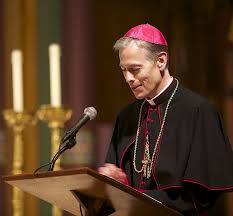Liturgical music. The phrase may instil a faint feeling of nausea in those even remotely attuned to true beauty, as the strains of treacly hymns, and worse, of the past half-century drift into our consciousness.
But, now, a glimmer of hope, for finally, an Archbishop– one Alexander Sample of Portland, Oregon – has written and spoken out clearly on music, advocating the use, even the need, of Gregorian chant, and this in the Novus Ordo Mass, where it belongs just as much as in the usus antiquior. (For the full text of his pastoral letter, please see here.)
This is remarkable, but should not be, for everything in his Grace’s letter is a reiteration, in his own words, of what was taught at the Second Vatican Council, in its Constitution on the Sacred Liturgy, which has never really been put into effect, something upon which I wrote a while back.
The good Archbishop laments the state of liturgical music in his diocese and in the wider Church, charitably recognizing the efforts of less-than-well-trained, and perhaps even not all that well-intentioned, musicians. Music at Mass that consists of four-layered ‘hymn sandwiches’ – and not very exalted hymnody at that –do not constitute liturgical music. In fact, hymns are extrinsic to liturgy, and should be treated so, used only in the processional and recessional.
Rather, it is Gregorian chant is the music ‘proper’ to the liturgy, which means that something is sorely missing without it. Polyphony, as an extension of the chant into more than one harmonious voice, along with the organ, that ‘instrument of instruments’, and which should be held in ‘high honour’ as the primary accompaniment at Mass – add sublime and transcendent beauty and solemnity to those parts not chanted.
And one final note: Archbishop Sample also calls for silence at Mass, yes, that rare stillness, the necessity of which Cardinal Sarah has written so eloquently, where we might be quiet and receptive to God, to the ‘still, small voice’ that spoke to Elijah, and to saints through the ages.
So there is hope yet, if Archbishop Sample’s letter stirs a quiet revolution away from the banality, apathy and chaos that now confront us in our liturgical no-man’s land. We should not have to walk into a Mass wondering what might happen, and what music – to say nothing of all the other irregularities – we must confront. There should be a regularity and order to liturgy, in words, music, gestures, clothing, architecture, in accord with the Church’s consistent teaching.
We should pray that bishops take heed: One of their own has spoken, and spoken truly. We would all do well to listen, for Christ will ask us why we did not.

